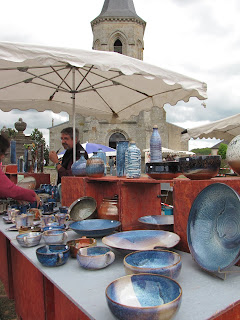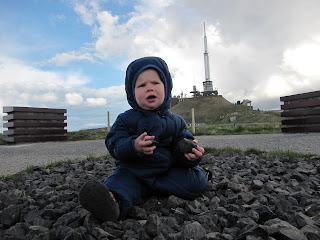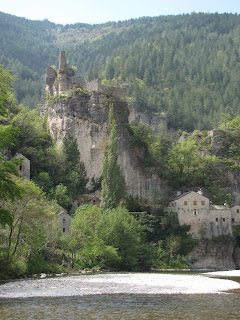Please see English below!
----------------------------------------------------------
Kaut vēl neesam ievākušies dzīvoklī, ar lielu sajūsmu gatavojos uz Lieldienām. Mums brauc pirmie ciemiņi, Roberta brālis Matīss ar savu draudzeni Indru, un šīs būs Lauŗa pirmās Lieldienas, kā arī mums visiem pirmās Lieldienas Francijā.
Esmu svinējusi latviskas Lieldienas Čikagā (Illinojā), Džordžijā (A.S.V.) ar savu vecmammu, Cincinnati (Ohaijo) ar Roberta omammīti un tanti Mary Margaret un ğimeni, un pagāšgad Grīnvilē (Dienvidkarolīnā). Citas pilsētas, cita kompānija, bet viena lieta nemainās; sīpolu mizās krāsotas olas! Džordžijā tām parādijās azalea ziedu nospiedumi, Dienvidkarolīnā, būdama stāvoklī ar Lauri, gandrīz uzdevu krāsošanu pusceļā, jo smaržas lika manam vēderam griezties. Un sen atpakaļ Čikagā daudzreiz apnika ēst olas jo nokrāsojām tik daudzas. Un tā šogad pirms pāris nedēļām izskaidroju šo paražu manām I.W.C. draudzenēm. Es lūdzu viņām krāt sīpolu mizas, un sarīkoju nedeļā pirms Lieldienām satikšanos mūsu dzīvoklītī, lai krāsotu Lieldienu olas.
Pirms nedēļas veikalā skatijos pirkt olas, un tā atklāju pirmo šķērsli. Clermont-Ferrand nepārdod baltas olas. Skaistās brūnās oliņas kuŗas A.S.V. pārdod visos „organiskos” veikalos, šeit tās ir vienīgās olas pieejamas. Sākās lielā meklēšana. Es pati izmeklēju trīs veikalus pirms zvaniju palīgspēkiem. I.W.C. diskusiju lapās uzdevu šo jautājumu un pat feisbuka grupā lūdzu vietējos draugus palīgā. Aizvakar manas draudzenes Marion un Marine pavadija pāris stundas zvanot visiem vietējiem veikaliem, tirgiem un pat lauksaimniekiem, velti meklējot baltas olas. Un tā vakar sanāca mammas ar saviem bērniem un maisiem pilniem ar sīpolu mizām, bet olu krāsošana nenotika.
Aizvakar vakarā tas, ka olu krāsošana izkritīs, bija jau samērā skaidrs. Joka pēc nopirku sarkanos kāpostus un 10 brūnās olas (te nepērk duci, bet desmit), izmēğināt, vai tās uzņem krāsu. No rīta rezultāts; nevis skaisti lillā/zila ola, bet tāda pļurīgi brūna/zila. Rādiju draudzenēm, viena pat bija nopirkusi pāris kastītes „visgaišākās brūnās olas” kuŗas viņa varēja atrast un mēs visas piekritām; nākamgad olas importēsim jau pāris nedēļas pirms Lieldienām!
Esmu drusku bēdīga, ka Laura pirmās Lieldienās nebūs sīpolu mizās krāsotas olas. Bet tagad domāju, kā saistīt latvisko ar vietējo. Pirms nedēļas neiznāca atrast pūpolus, bet tos jau Dienvidkarolīnā un Džordžijā nevarēju atrast. Varbūt jādabon paskas recepte no vecmammas? Šeit Francijā ir ierasts meklēt paslēptas šokolādes Lieldienu olas, esam jau pieraduši ar Roberta ğimeni meklēt Lieldiena zaķa paslēptos groziņus. Protams cietvārītas olas kuŗas nav nokrāsotas ar sīpolu mizām vēl ir derīgas uz sišanos. Un Svētdien noteikti iesim šūpoties lai aizbaidītu odus. Tomēr svarīgākais, baudīsim mūsu pirmos ciemiņus te Francijā, skaisto laiku un pateiksimies par visu to ko Dieviņš mums devis.
-------------------------------------------------------------
Although we have still not moved into our apartment, I have started Easter preparations with much enthusiasm. Our first guests, Roberts’s brother Matīss and his girlfriend Indra will be here, and this is also Lauris’s first Easter as well as our first Easter in France.
I have celebrated a Latvian Easter in Chicago, in Hillsboro, Georgia with my grandmother, in Cincinnati with Roberts’s grandmother, aunt Mary Margaret and family, and last year in Greenville, SC. The scenery and participants keep changing, but one thing remains constant; eggs colored in the Latvian tradition of boiling with onion skins after wrapping with blades of grass, leaves etc. to leave designs in the brown color. In Georgia my eggs showed faint color from the azalea petals I used in the wrapping, in South Carolina I almost had to quit halfway through because of the impact the smell had on my pregnant senses, and a long time ago in Chicago I remember coloring so many eggs that by May I was sick of eggs and could not eat them again until June. And so a few weeks ago I explained this tradition to my I.W.C. friends, asked them to please save their onion skins and organized an egg-coloring playdate the week before Easter in our apartment.
A week ago I discovered the first hurdle while in the store shopping for eggs. There are no white eggs for sale in Clermont-Ferrand. Those beautiful brown eggs which are sold in all the organic aisles in the US supermarkets, or which I used to get from my coworkers that raised chickens back in Georgia, those are the norm here. The great search was on! I went to three stores before calling in reinforcements. After posing this question on the I.W.C. discussion forum and in a Facebook post, I enlisted local help. A few days ago my friends Marion and Marine spent hours on the phone calling local stores, markets and even farmers, searching for œufs blancs, without result. Suggestions included painting brown eggs white, using ostrich eggs, and buying my own white chicken. And so yesterday many of the moms from the mother and baby group came to my apartment with bags full of onion skins and items for decoration, but the egg coloring did not take place.
 |
| Instead of coloring eggs, the 3 boys worked on the plumbing |
When the night before last it seemed pretty clear that we were not going to find any white eggs, I bought a head of red cabbage and 10 eggs to see if they would absorb any color. Another Latvian coloring technique involves boiling the eggs in the cabbage to produce a bluish/purple color. This morning’s result was not the anticipated beautiful deep blue, but a brownish sludge. I showed my friends, one of whom had even bought a few boxes of „the lightest brown eggs she could find” and we all agreed; next year we specially order/import white eggs a few weeks before Easter!
I am sad that I will not be able to continue this tradition for Lauris’s first Easter. But this also has me thinking how to incorporate the Latvian with the local. Maybe I get the recipe for „paska,” a traditional Latvian Easter food, from my grandmother? Here in France I understand that it is popular to go on Easter egg hunts, and since we are already accustomed to searching for the baskets the Easter bunny has left us with Roberts’s family, this might be a fun activity. There is also the Latvian tradition of swinging as high as possible on Easter Sunday to keep the mosquitoes at bay for the rest of the year. And finally all hardboiled eggs are used in the “sišanās,” where one person taps the egg of the next, with the last unbroken egg the winner. But as I brainstorm, search the internet and discuss with my international friends their Easter traditions, I remind myself that Easter is not only about eggs and rabbits. Most importantly, Easter this year will be for enjoying the company of our first visitors here in France as well as the beautiful weather, and thanking God for all the blessings He has bestowed on us this past year.


































